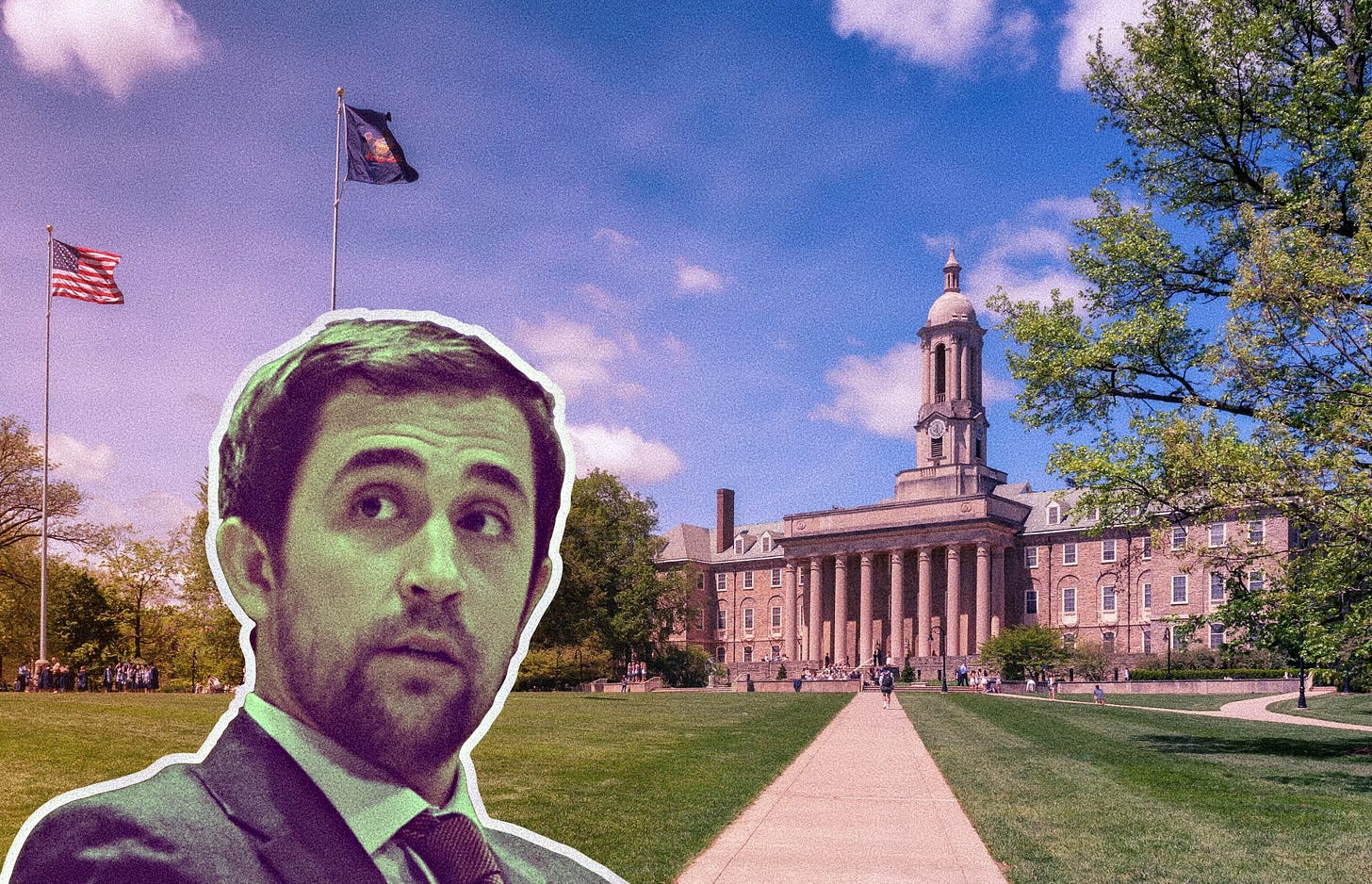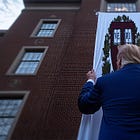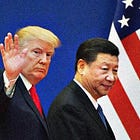A Manhattan Institute Manifesto Would Give this President Sweeping Power to Force University Compliance with Right-Wing Demands
The statement is selling a naked ideological agenda as a defense of campus free speech

Many persons I’d think would know better have affixed their names to a new and highly illiberal set of demands on colleges and universities.
Billing itself as the “Manhattan Statement,” the new manifesto was sponsored by the New York-based Manhattan Institute for Policy Research. (I was affiliated with the Institute for many years, through 2010; so far as I know I haven’t met the drafters of this document). One of its promoters has labeled it “a program of national reform.”
That is misleading.
What is distinctive about the Manhattan Statement is not that it calls for reforming universities; others regularly call for that. In fact, many of its reforms, considered at a vague and aspirational enough level of abstraction, are neither new nor even particularly controversial. What stands out is by whom and by what means the manifesto proposes to impose the changes: by dictation from the central government in Washington, employing force and ultimatum, devoid of any advance enactment of objective rules defining what universities’ obligations in fact are.
If imposed, the result would be an utter centralization of peremptory power over academia—private colleges, state universities, religiously affiliated institutions—in the person of a single man. And while the Manhattan Statement coyly avoids naming the current president, it is fair to say that it means specifically Donald Trump, since it’s utterly unthinkable that the signers would propose handing such boundless power to a liberal or Democratic occupant of the White House.
After beginning with a few paragraphs of bad potted history and ipse dixits, the document launches directly into screech mode: “universities have brazenly, deliberately, and repeatedly violated their compact with the American people” to “serve the public good.”
The first problem here is that it is not apparent what if any stable or broadly held understanding of such a “compact” there has been, aside from the specific legal obligations already placed on universities. (Leaving aside the cluster of laws around discrimination, the statement doesn’t seem very interested in those existing laws.) Nor does it linger on whether the all-important “public good” concept, on which its theory hinges, might be seen differently by the diverse constituencies universities serve, from parents and students to alumni and donors, state governments and taxpayers, employers of future grads, the beneficiaries of research, and so forth. It does not seem interested in the expectations of most of these groups, either.
A couple of trite paragraphs later, it’s on to a long list of right-wing culture-war complaints it pins on higher education. The result is a mix of what to me seem fair criticisms (faculty hiring often reproduces ideological monoculture, worsened by devices like compulsory diversity statements that function to screen out conservative doubters) alternating with absurd and strident hyperbole (universities “have, in effect, declared war on millions of Americans who simply want to live, work, worship, and raise families in peace.”)
Strikingly, some of the grievances do not seem particularly closely tied to issues of university governance. It is aggrieved at the advent of underage trans medical interventions. While some university-affiliated hospitals and clinics got involved in that, many others in this field have no academic affiliation, and most colleges have no medical schools to begin with.
The document is aggrieved also at Covid-19 public health orders. Were universities really the ones driving that episode? Governments, not universities, are the bodies that wield public health authority over the general population. It’s true that universities, in their capacity as employers and operators of dormitories and convening spaces, adopted rules meant to forestall contagion and serious illness among employees and residents. But then so did the run of other institutions, including private and public employers, conference centers, event planners, and so forth. Why are colleges being singled out?
To put it differently, the document’s tirade against university governance soon becomes hard to disentangle from an ever-so-familiar, roving gripe against “elites.” Perhaps the implied logic is that dubious ideas keep circulating among American elites, that universities are engines for turning out future elites, and that universities therefore need to be restructured so as to turn out elites that will have different ideas (more in line with the authors of the statement). But if that’s the idea, it’s all quite inchoate.
Almost at once we’re on to another laundry list, this time a six-point list of what the signers think universities affirmatively should be doing. Some of these have drawn controversy in early reactions from critics, on such matters as information disclosure and the application of federal civil rights laws, but I want to concentrate on the ones that don’t seem controversial. Universities “must advance truth over ideology.” Decision making at all levels must be “merit-based.” Standards of academic conduct must be “rigorous.” While they’re at it, colleges must embrace “the highest standard of civil discourse.”
Why didn’t anyone tell us it would be this simple? It would be easy to line up a thousand faculty progressives happy to endorse the elevation of truth over ideology, an adherence to rigorous standards of academic conduct, the making of decisions based on merit, and the upholding of the highest standards of discourse—although inevitably differences of opinion would soon manifest as to what each of these terms means. Whichever side you take on whichever issue, it’s likely you believe your side does a better job of living up to pleasant generalities about truth and rigor.
But the kicker is what comes before the string of wet noodles. It’s this paragraph, which is the real centerpiece of the manifesto. It is worth close attention, up to and including its final eight words:
“To that end, we call on the President of the United States to draft a new contract with the universities, which should be written into every grant, payment, loan, eligibility, and accreditation, and punishable by revocation of all public benefit.” [italics added]
Vague prescriptions on their own are one thing. Vague prescriptions drafted by a strongman ruler, forced into every corner of the world of higher learning, and enforced by the sudden and arbitrary imposition of an institutional death penalty come off differently, don’t they?

Trump Goes After Harvard's Tax-Exempt Status Because the Univeristy Spurned His Ideological Demands
Consider how this would work. Trump drafts and imposes on every institution of higher ed vacuous yet momentous dictates—for example, that they place truth over ideology. Three months later, someone in the White House social media feed complains that a college has permitted ideology to be placed over truth in a particular program or the classroom of a particular professor. What happens next? Some White House gofer places a call, and—unless the college is absolutely determined to make a martyr of itself—it adjusts the problem to the satisfaction of the rulers. It’s not as if the plan so much as nods toward crafting some sort of objective legal trigger to evaluate the dispute, let alone submitting it to the judgment of a court.
Then would come all the further complaints that some scholar’s published paper didn’t meet “rigorous standards,” that a faculty hiring choice wasn’t “merit-based,” or that a campus forum didn’t attain the “highest standards” of discourse. There would follow the phone call (better than putting something in email!) and the university would hop to comply—either that, or eye the guillotine of “revocation of all public benefit.”
Nothing could be a broader invitation for those who consider themselves in possession of truth to impose harsh measures on contrary thinkers who they dismiss as in the grip of ideology. Just to ice the cake, the statement has the nerve to throw in some talk about “the principle of freedom of speech,” about how colleges “must provide a forum for a wider range of debate and protect faculty and students who dissent from the ruling consensus.” It recites this language as if it is advancing these liberal values, as opposed to constructing a governance mechanism calculated to render meaningless every one of them.
It gets worse. No bureaucracy in Washington, D.C., no matter how conscientiously staffed and careful in its procedures, could be entrusted with the power to enforce—with annihilating penalties—this combination of vague standards. But it’s unlikely that a bureaucracy will be in charge, as opposed to the simple will of those in a chain of command.
Note that the statement says nothing about determining the lineaments of the supposed new “compact” by having the nation’s elected lawmakers deliberate on a bill in Congress. Instead, it calls on the president-as-strongman to draft the terms and impose them on the universities—acquiescing right there, without discussion, to the emerging personalist nature of government action under Donald Trump.
Don’t be fooled. This is not some mere compilation of pleasant principles we might wish would hold greater sway among college administrators. It is a plan of control aimed effectively at putting academia under centralized command.
It is also an attempt to validate in retrospect the actual practices of the Trump administration, for whom peremptory defunding, illegal and otherwise, has been a favorite way of imposing its will. Those familiar with university governance know that it’s not new in itself for the federal government to dictate overbearing terms to universities, and that funding cutoff threats have been a part of that. Still, the arrangements in place until this January—deeply imperfect though they were—retained important elements of due process, such as rights to be informed of charges of misconduct and to present evidence in one’s defense, including before a judge. Regulations drew also on the so-called notice and comment procedures that make federal policy slower but more deliberative. They also often at least nodded toward the fair-notice principle of laying out clear prohibitions ahead of time rather than leaving target institutions to wonder whether their actions are in compliance. And administrations sometimes resorted to persuading Congress to enact new rules where they believed current law fell short.
Trump appointees have treated these procedural and legal safeguards with contempt. They have repeatedly defunded universities on claims of misconduct without waiting for them to put forward a defense, let alone waiting for courts to evaluate the merits. They have adopted radically new legal interpretations in areas like civil rights law—admittedly, with impetus from Supreme Court’s rulings in cases like Students for Fair Admissions vs. Harvard that outlawed race-based admissions policies as unconstitutional—without the sort of deliberate process that might expose weaknesses in the positions they mean to take. They regularly behave as if the law is already on their side even when courts have found no such thing, indeed where precedent is contrary.
The Manhattan Statement evades these issues almost entirely, merely expressing generalized impatience at the slow pace at which universities have complied with the supposed will of the people. It seems significant to me that the present list of signers is exceedingly short on lawyers and law professors.
One of the manifesto’s other demands is that universities, as universities, stop criticizing things. It sounds as if I’m making that up, and to be fair the demand is a bit more subtle: it claims “the proper vehicle for criticism is through the individual scholar and student, not the university as a corporate body.” It condemns any institutional endorsement of critical stances as “social and political activism,” in which they “must cease their direct participation.” This, of course, to some extent tracks (and takes coercive sides in) the genuine and serious ongoing discussion about whether universities should adopt policies of “institutional neutrality” (a term the statement does not use; like “court” and “due process,” “neutrality” is yet another term interestingly absent when you search it).
There is much to commend institutional neutrality as a principle for university administration, especially at institutions that aim to serve broad student and scholarly constituencies as well as those that are part of government. But it would be bizarre, disturbing and grossly un-pluralistic to seek to abolish every private educational institution founded to inculcate a definite chosen mission that includes moral or reformist elements. As it stands, the statement seems to imply that so long as a single student attends using a single federal loan dollar—remember that G.I Bill benefits cover enrollment in seminary instruction for future clergy—colleges may not organize a mission around what they see as a moral witness to the world and attempt to shed the light of their learning on public evils. (The statement tiptoes around the existence of religiously based universities, as around so much else.)
Some of the signers of the Manhattan Statement have made reputations as champions of free speech; some, following influential religious thinkers, have championed local subcultures and intermediating institutions against the mass forces of top-down homogenization; and some have written eloquently about life under regimes that fasten political conditions on whether intellectuals can make a living as intellectuals. Most, I think it’s fair to say, see themselves as seeking to prize and perpetuate the distinctive traditions of Western civilization.
These distinctive civilizational values depended intimately on the rise of university independence as it emerged from medieval and then Renaissance times in Western Europe. Kings, princes, and vandalous mobs came and went, but the universities governed themselves—and were a key element in the success we know as the West.
Are the signers here conscious of the risk of throwing it all away?
© The UnPopulist, 2025
Follow us on Bluesky, Threads, YouTube, TikTok, Facebook, Instagram, and X.
We welcome your reactions and replies. Please adhere to our comments policy.








Excellent article about MI's statement. What I find really interesting is that students pick the school they want to attend and pick the classes they take. Don't go to a school that you think is too radical. I teach at Berkeley and we offer more than 2,000 classes per semester and here is a lot of information about the classes available to the students.
The Manhattan Institute also states that the American People provide ~150 billion dollars to the universities. This is true but the money is for research which is separate from undergraduate teaching. And just at Berkeley, the research has resulted in new immune-system based cancer treatments (recent Nobel Prize), an ultra small, efficient transistor used in all high performance computer chips, MEMS devices that let your cell phone know which way is up, etc.
More than a bit ironic that the Statement is authored by the architect of Florida's anti-woke legislation, which a federal judge struck down as violating faculty members' and students' first amendment rights.